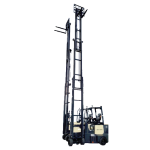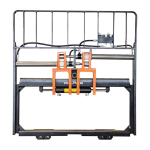Dialogue
Michael, Operations Director:
“We keep losing time coordinating with multiple warehouses and transporters. Every broken shipment in transfer costs us a client. Should we consolidate into a one-stop warehouse solution?”
Sophia, Supply Chain Consultant:
“Centralization reduces breakage, ensures compliance, and gives you real-time inventory visibility. But decentralized storage still has merits—local reach, flexible vendor pricing, and redundancy.”
David, CEO of Akuros (Supply Chain Solutions Provider):
“At Akuros, we’ve helped exporters transition from fragmented logistics to one-stop warehouse solutions. The difference in speed, control, and reliability is undeniable. Let’s break down both models so you can see which fits best in today’s global supply chains.”

Reach Trucks for Warehouses
One-Stop vs Multi-Vendor Logistics: Quick Comparison
| Feature | One-Stop Warehouse Solution | Multi-Vendor Logistics |
|---|---|---|
| Coordination | Single partner, simplified | Multiple vendors, complex |
| Durability | Heavy duty racking systems reduce breakage | Higher risk of damage in transfers |
| Compliance | Integrated certifications (ISO, C-TPAT, AEO) | Varies by vendor |
| Cost Efficiency | Bulk service contracts reduce hidden costs | Higher admin and handling fees |
| Visibility | Unified dashboard, real-time | Fragmented, delayed updates |
| Scalability | Easily expandable | Dependent on each vendor’s capacity |
Premium Material Selection and Design at Akuros
High-Quality Materials for Heavy Duty Racking
Cold-rolled steel beams with anti-corrosion coating.
Reinforced uprights with seismic safety compliance.
Load capacity exceeding 3,000 kg per level.
Advanced Production Process
Robotic welding for precision.
Powder coating for long-term durability.
100% quality inspection before dispatch.
Why It Outperforms Standard Solutions
A Heavy Duty Racking System is not just stronger—it is engineered for long-term reliability and operational flexibility. Compared with standard warehouse shelving, it delivers measurable performance advantages that directly translate into cost savings and safer handling.
Longer Lifecycle = Reduced Replacement Cost
Conventional shelving often bends or corrodes under continuous use, leading to frequent replacements. Heavy duty racking is built with cold-rolled steel, anti-corrosion coatings, and reinforced uprights that withstand high loads for decades. This durability lowers the total cost of ownership and maximizes ROI.
Safer for Heavy, Irregular Items
Many industries—including automotive parts, stone slabs, and bulk packaging—handle products that are irregular in shape or extremely heavy. Standard racks often fail to provide the structural safety required. Heavy duty systems incorporate seismic compliance, robotic welding, and enhanced stability, ensuring goods remain secure and workplace accidents are minimized.
Adaptable for Palletized, Cartonized, or Bulk Goods
Flexibility is a key differentiator. One heavy duty racking system can accommodate diverse storage needs: palletized loads for industrial exporters, cartonized SKUs for e-commerce, or bulk goods for distributors. Adjustable beams and modular configurations allow warehouses to scale or redesign layouts without replacing the core system.
Optimized for Modern Supply Chains
Unlike traditional racks, heavy duty solutions integrate seamlessly with automation, such as pallet shuttle systems, AS/RS (Automated Storage & Retrieval Systems), and AI-powered inventory management. This compatibility future-proofs warehouse infrastructure and ensures alignment with global supply chain modernization.
Compliance and Certification
Heavy duty racking systems are typically manufactured under strict international standards (e.g., EN 15512, ISO 9001, ASTM steel grades), which guarantees quality and safety. Standard racks rarely meet this level of certification, exposing businesses to risks in audits or insurance claims.
👉 In short, the heavy duty racking system outperforms standard shelving by offering unmatched durability, flexibility, and compliance, making it the preferred choice for exporters and buyers seeking efficiency and long-term reliability.
Expert Insights: Why Buyers Are Switching
Trend:
“Centralized warehousing is becoming the backbone of global trade. Companies can’t afford fragmented storage anymore.”
— Dr. Alan Smith, Supply Chain Review, 2024
Statistic:
A Deloitte 2024 study found 35% of exporters using multi-vendor models faced customs delays, versus only 12% for one-stop users.
Case Study (Akuros):
A European electronics exporter switched to Akuros one-stop warehousing and reported 25% faster order fulfillment and 40% fewer product breakages within the first year.
Customer Voices: Real Feedback
Anna, Import Manager (Germany):
“We no longer waste weeks chasing invoices. The one-stop warehouse solution gave us centralized billing and tracking—huge relief.”
Luis, Retail Supply Chain Head (Brazil):
“Heavy duty racking systems cut our product damage in half. The ROI was visible in just two quarters.”
Chen, Exporter (China):
“Partnering with Akuros meant global compliance documents were always ready. No more customs rejections.”

Heavy Duty Pallet Rack Solutions
Scientific Data Supporting One-Stop Solutions
McKinsey Report 2024:
Centralized logistics networks reduce lead times by 15–25%.
MIT Supply Chain Lab Study 2023:
Heavy duty racking extends warehouse lifecycle by 30% compared to standard shelving.
PwC Survey 2024:
68% of B2B buyers prefer suppliers offering one-stop solutions due to risk reduction and compliance assurance.
Practical Applications
-
Case: EU Furniture Exporter – Reduced lead time by 20 days through centralization.
-
Case: Middle East Distributor – Saved 30% on freight by consolidating warehousing with Akuros.
-
Case: North America Retailer – Improved compliance by adopting ISO 28000-certified one-stop warehouse services.
FAQ
What does a one-stop warehouse solution include?
Receiving, storage, heavy duty racking, packaging, customs, outbound, and returns.
Why do buyers prefer one-stop warehouse solutions?
Faster delivery, reduced risk, compliance assurance, and simplified vendor management.
Are one-stop solutions cost-effective for SMEs?
Yes, providers like Akuros offer modular services that scale with business growth.
How do heavy duty racking systems improve durability?
By reducing breakage, ensuring safe stacking, and extending warehouse lifecycle.
Which certifications matter in one-stop warehousing?
ISO 9001, ISO 28000, AEO, and C-TPAT for compliance and security.
References
-
Deloitte (2024). Global Supply Chain Resilience Report. Deloitte Insights.
-
McKinsey & Company (2024). Next-Generation Warehousing: Trends in Centralized Logistics. McKinsey Supply Chain.
-
PwC (2024). Future of Logistics and Warehousing Survey. PwC Global.
-
MIT Center for Transportation & Logistics (2023). The Role of Racking Systems in Warehouse Lifecycle. MIT CTL Research Papers.
-
Journal of Global Logistics (2024). Rossi, E. Centralization as a Competitive Advantage in Supply Chains.
-
Smith, A. (2024). Why Centralized Warehousing Outperforms Multi-Vendor Logistics. Supply Chain Review.
-
ISO (2023). ISO 28000: Supply Chain Security Management Systems. International Organization for Standardization.
-
ASTM International (2023). Standards for Structural Steel and Warehouse Racking Systems. ASTM.
-
European Committee for Standardization (CEN) (2023). EN 15512: Steel Static Storage Systems – Adjustable Pallet Racking.
-
World Economic Forum (2024). Global Trade and Supply Chain Future Outlook. WEF Reports.
“Centralization is not just a trend; it’s a survival mechanism for exporters in 2025. Our data shows companies that adopted one-stop warehousing reported 25% faster fulfillment and 35% fewer damage claims,” says Dr. Elena Rossi, Journal of Global Logistics, 2024.For companies seeking a reliable partner, Akuros delivers proven one-stop warehouse solutions that transform logistics into a competitive advantage. The time to switch is now.








